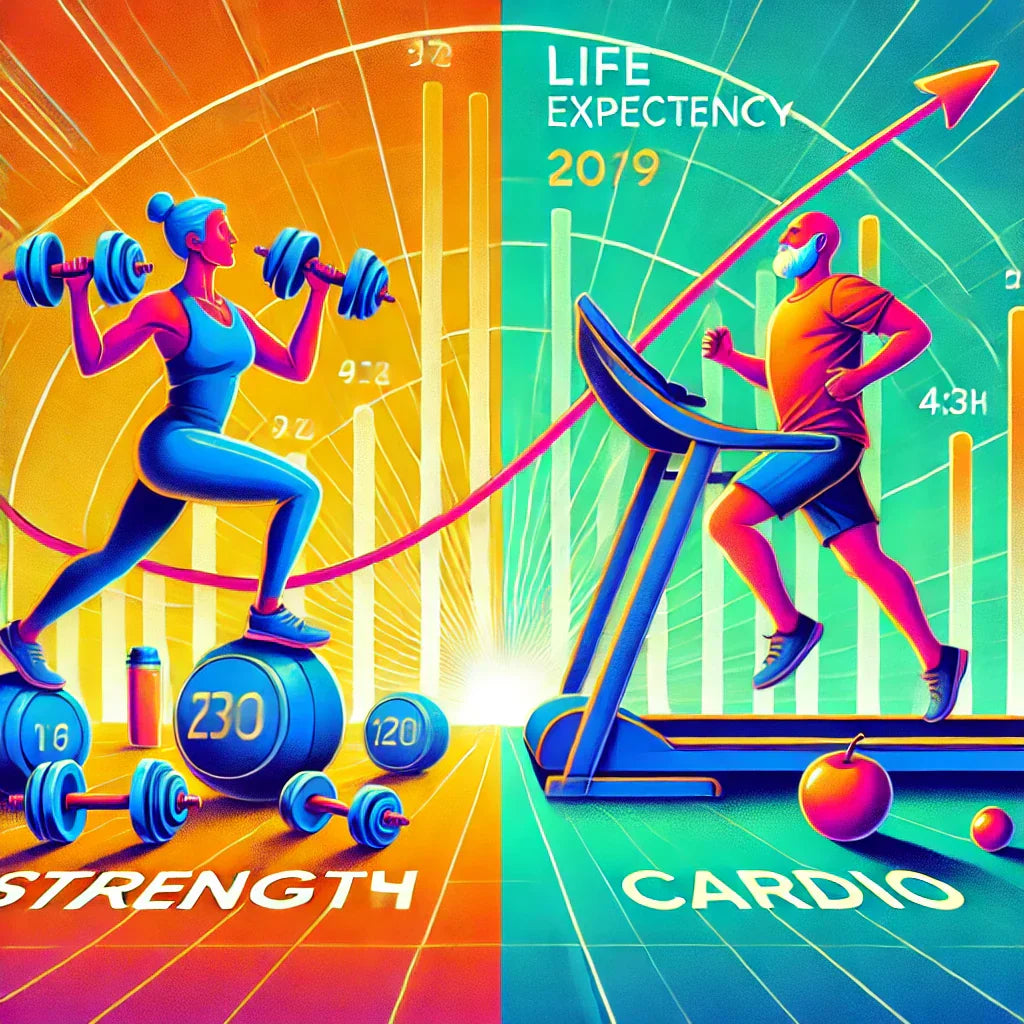💪 Strength and Cardio: The Two Surprising Keys to Living Longer

💪 The Strength to Live: Why Being Weak Might Literally Kill You
The Science of Longevity: Why Strength and VO2 Max Matter More Than Diet (Or Even Smoking)
We’ve all heard the usual suspects when it comes to dying early: smoking, diabetes, high blood pressure, and the occasional attempt to "cleanse" your body with nothing but celery juice. But what if I told you that the biggest predictors of longevity aren’t any of those?
I came across a video recently (thanks, TikTok!) that blew my mind: the two most powerful predictors of how long you'll live aren't smoking or chronic diseases—they're strength and cardio-respiratory fitness. And not by a small margin either—we’re talking jaw-dropping numbers that make even smoking look like a minor inconvenience.
How big? Let's break it down:
- Hypertension increases mortality risk by about 20%.
- Type 2 diabetes increases it by around 30%.
- Smoking (the holy grail of bad decisions) raises mortality risk by 50%.
But…
- Being weak versus being strong raises your mortality risk by a staggering 250%.
- And having poor cardio-respiratory fitness (VO2 max in the bottom 25% of the population) versus elite fitness? That’s a whopping 400% increase in mortality risk.
That's not just surprising—it’s terrifying—or wonderful, depending on whether you see opportunity or not.
Let’s Talk About Strength: Why Weakness Is Deadly
Strength isn't just about looking good in a tank top or finally being able to open that stubborn pickle jar. It turns out that muscle mass and grip strength are strong predictors of overall health—and more importantly, of survival.
A major 2015 study published in The Lancet looked at over 140,000 participants across 17 countries and found that low grip strength was strongly linked to increased mortality from all causes—including cardiovascular disease. In fact, the researchers found that grip strength was a better predictor of death than even blood pressure.
Think about that: your hand strength is a better predictor of how long you’ll live than the numbers your doctor stresses about at every visit.
Why Strength Matters:
- Muscle is Metabolically Active – More muscle mass increases your metabolic rate, helping regulate blood sugar and body weight.
- Fall Prevention – Stronger muscles = better balance = fewer falls = fewer hip fractures or worse = less dying.
- Inflammation and Immune Health – Muscle tissue helps regulate inflammation and supports a stronger immune system.
- Bone Density – Resistance training increases bone density, reducing the risk of osteoporosis and fractures.
- Body Protection – Muscles protect joints, support articulations, and ease movement, enhancing cardiovascular fitness and strengthening mental health and wellness.
The bottom line? Strength training isn’t just for bodybuilders—it’s for anyone who wants to stay out of the hospital.
VO2 Max: The Real Fountain of Youth
If strength training is important, cardio-respiratory fitness might be even more so. The metric that really matters here is VO2 max—essentially, how efficiently your body can take in and use oxygen during exercise.
A landmark 2018 study in JAMA Network Open followed over 120,000 patients and found that having a VO2 max in the bottom 25% of the population increased your risk of death by 400% compared to those in the top 2.5%. That’s eight times the mortality risk of hypertension.
Why VO2 Max Is So Important:
- Heart and Lung Efficiency – Higher VO2 max means your heart and lungs are better at delivering oxygen to your muscles and organs.
- Lower Inflammation and Oxidative Stress – Aerobic exercise reduces markers of inflammation, which are linked to nearly every chronic disease.
- Insulin Sensitivity – Improved VO2 max enhances your body’s ability to regulate blood sugar, reducing the risk of type 2 diabetes.
- Heart Health – Better cardio fitness = lower blood pressure, better cholesterol levels, and reduced risk of heart attack.
So yes, the next time someone tells you that running is bad for your knees, just remind them that poor cardio fitness is worse for literally everything else.
How to Improve Strength and VO2 Max (Without Hating Your Life)
The good news? Improving strength and cardio fitness doesn’t require a full-time commitment to CrossFit or a marathon training program. Here’s how you can boost both without wrecking your schedule (or your sanity):
1. Strength Training:
- Twice a Week: Lift weights or do bodyweight exercises (squats, push-ups, planks) for 30–45 minutes, 2–3 times a week.
- Focus on Compound Movements: Exercises like squats, deadlifts, and pull-ups recruit multiple muscle groups and give you more bang for your buck.
- Progressive Overload: Gradually increase the weight or resistance to keep challenging your muscles (your body adapts quickly).
👉 Pro tip: If you can’t lift heavy, work on grip strength—use resistance bands, hang from a bar, or carry heavy things (like groceries or your ego).
2. Cardio-Respiratory Fitness:
- High-Intensity Interval Training (HIIT): Short bursts of intense effort followed by rest. Example: 30 seconds sprinting, 1-minute walking, repeat for 15 minutes.
- Zone 2 Cardio: Long, steady-state cardio at 60–70% of your max heart rate (e.g., a brisk walk or casual bike ride) for 30–60 minutes, 2–3 times a week.
- Mix It Up: Running, swimming, cycling, rowing—pick what you like and stick with it.
👉 Pro tip: VO2 max improves fastest with high-intensity efforts—but you don’t need to kill yourself. Consistency matters more than intensity.
Why Most People Don’t Do This (and Why You Should)
Let’s face it—strength training and cardio workouts don’t have the sex appeal of a juice cleanse or the novelty of a fad diet. But the data is clear:
💪 Strength training = 250% mortality improvement
🫀 High VO2 max = 400% mortality improvement
In other words, doing squats and hitting the treadmill will save your life faster than giving up sugar or counting carbs.
Final Thoughts: Strength + Cardio = Longevity Gold
It’s not that things like smoking, hypertension, and diabetes don’t matter—they absolutely do. But when you’re talking about maximizing your health span (not just life span), strength and cardio fitness are the real MVPs and should be an integral part of your personal hygiene (perhaps as much as soap).
If you’re looking to hack longevity, stop obsessing over supplements and detox teas. Get strong. Get fast.
And maybe keep a dumbbell next to your Peloton—because that’s how you win the game of life.
👉 Now, if you’ll excuse me, I’m off to test my VO2 max. (Spoiler: it’s not that great, but working on it.) 😎
🔥 Ready to Start?
Strength training and cardio workouts aren’t just for gym rats—they’re for anyone who wants to live longer (and better). Start small, stay consistent, and don’t be surprised when you suddenly have the energy of a teenager (minus the bad decisions).
Quick links
Search
Privacy Policy
Refund Policy
Shipping Policy
Terms of Service
Contact us
About us
FUNanc!al distills the fun in finance and the finance in fun, makes news personal, and helps all reach happiness.

Got a thought? A tip? A tale? We’re all ears — drop it below.: